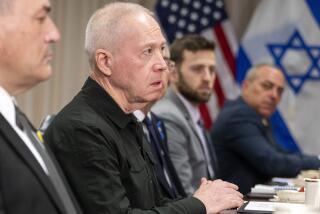Military Effort Would Be Perilous
- Share via
WASHINGTON — As the Bush administration began weighing strikes against terrorist havens in Afghanistan, defense officials and military experts said Thursday that major operations in the rugged terrain could require months of preparation and probably would entail U.S. casualties.
Because of a primitive infrastructure and the hostility of many Afghans, a major ground campaign would require a lead time long enough to allow several divisions of troops and their supplies to reach the region, experts said. An assault by special operations forces would probably lead to some U.S. casualties because of the difficulty the units would face trying to wend their way across the rugged, heavily armed region, they said.
And an air campaign, though easier in several respects, would have marginal value unless U.S. forces had the kind of timely intelligence about Osama bin Laden they have often lacked, experts said.
One military officer, noting that Afghans had defeated powerful intruders for more than a thousand years, said the country “may be the worst place on earth to do one of these things.”
U.S. Has Reviewed Scenarios Before
Pentagon officials said that over the last several years they have drafted various plans for possible operations in Afghanistan because of their concerns about Bin Laden and other terrorist groups in the country. U.S. intelligence has some familiarity with the region because of the aid the U.S. government offered Afghan rebels in their fight against the Soviet Union in the 1980s.
Yet they acknowledged that any effort would be hindered by a shortage of usable airfields, poor roads and faulty communications and utilities. Even the difficulty of local dialects will make it tougher for ground forces.
Another major obstacle to a military campaign is America’s poor relationship with most of Afghanistan’s neighbors.
State Department officials, including Secretary of State Colin L. Powell, have spent long hours this week trying to convince the Pakistanis to cooperate with the new counter-terrorist effort. Although the Pakistanis have sought to appear cooperative, experts said it would be difficult to persuade them to allow the United States to open a staging base in their country for a military effort in Afghanistan.
“I have to believe they would be very unenthusiastic” about permitting use of their territory as a base for a military strike, said Teresita Schaffer, a South Asia specialist and former U.S. ambassador, even though the Pakistanis are under strong pressure to help the United States fight terrorism.
Experts said they believe the U.S. government’s first choice would be to have Pakistan pressure the Taliban into finally forcing the withdrawal of Bin Laden’s network from Afghanistan. If that effort were to fail, U.S. special forces could be sent to Afghanistan seeking to kill or capture Bin Laden and other key figures in his network.
But experts said the long distances involved and rugged terrain would raise risks for the special forces and the helicopters that would carry them.
“You’re taking chances with those long distances and possible maintenance problems,” said retired Marine Lt. Gen. Anthony Zinni, the last commander of U.S. forces in the Middle East. The capabilities of special forces units are better than they were in 1980, when President Carter’s commando mission to rescue hostages in Iran failed. Yet, he added, “you face the same sort of circumstances.”
Military experts said that if the Pentagon does not want to go with a small special forces unit to try to track down individual terrorists, the next best choice would be to go with a very large force, of perhaps several divisions. That is needed, they said, so that the troops would have all the force protection and logistic support needed in the difficult environment of Afghanistan.
“You can go small, or you can go big, but you don’t want to have a force that’s in-between,” said retired Army Lt. Col. Ralph Peters. “You’ve got to support yourself and protect yourself.”
Country’s Conditions Stymied the Russians
Indeed, some experts warned that even a sizable force faces risks in the country, as the Russians learned. Though they built their force to 170,000 troops, against the country’s tough terrain and guerrillas with shoulder-fired missiles “it was never enough,” said Milt Bearden, who was CIA station chief in the country during the war.
But experts universally insisted that none of these approaches would make sense unless the United States is able to get intelligence--possibly with the aid of allies--that is accurate and timely.
When U.S. forces struck Bin Laden’s camps with cruise missiles in 1998, U.S. intelligence indicated he was there. But by the time the missiles were fired, Bin Laden had moved on, adding to the impression that the strikes were a meaningless gesture.
“You don’t want to use forces like this unless you’ve got very, very good intelligence,” Zinni said.
And some observers cautioned that despite the U.S. outrage over the casualties of this week’s attacks, the United States will need information that is good enough to allow strikes that don’t undermine the U.S. purpose by inflicting a lot of civilian casualties.
Although the United States will consider all alternatives, that “doesn’t mean carpet-bombing Kabul,” the Afghan capital, said Sen. John McCain (R-Ariz.). “It would be a surgical operation.”
More to Read
Sign up for Essential California
The most important California stories and recommendations in your inbox every morning.
You may occasionally receive promotional content from the Los Angeles Times.














